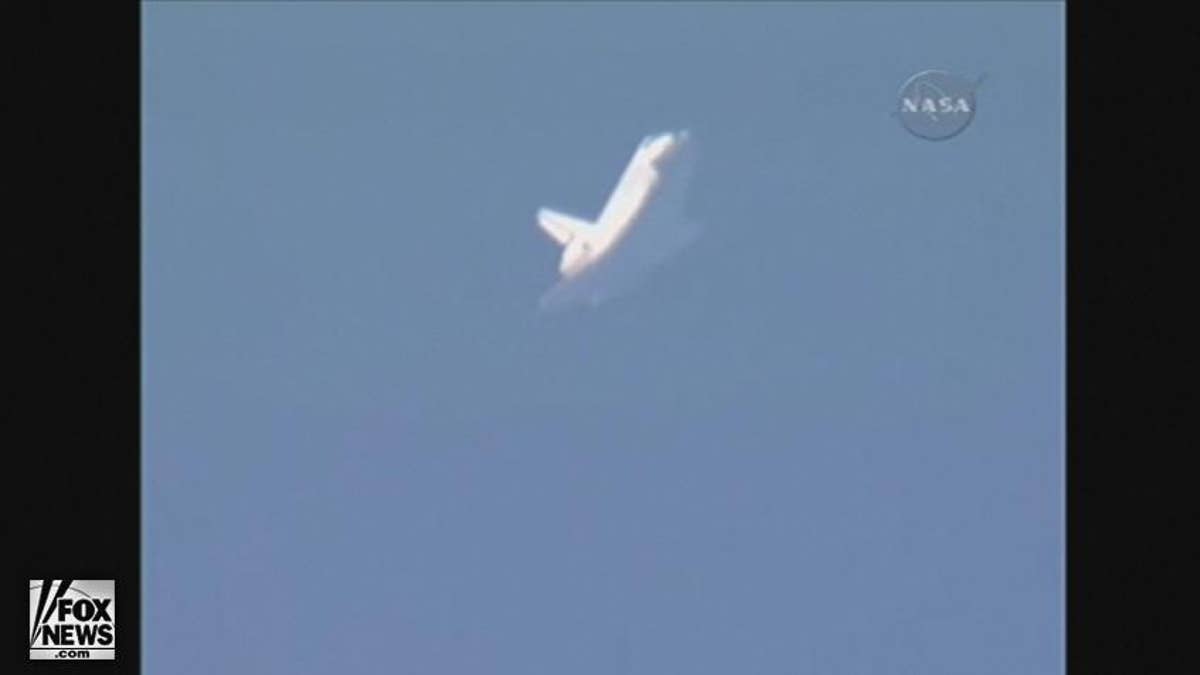
The space shuttle Atlantis is zooming towards a landing in Florida today transforming from spacecraft to aircraft -- wrapping up what could be its final voyage into space as NASA's shuttle era draws closer to its end.
Shuttle commander Kenneth Ham is slated to guide Atlantis to the ground at NASA's Kennedy Space Center in Cape Canaveral, Fla., at 8:48 a.m. EDT.
Early this morning, Atlantis completed the "deorbit burn" -- a rocket engine fire that slowed the ship and took it out of Earth's orbit. The procedure took place while Atlantis was about 220 miles above Indonesia.
Atlantis crossed the Florida Everglades and headed north, passing over Lake Okeechobee where it triggered dual sonic booms as it slowed to subsonic speeds. Commander Ken Ham aligned Atlantis with Kennedy's southeast to northwest runway 33. Touchdown is expected at 8:48 a.m.
"It's a great day in space and we're hoping it's a great day in Florida," Ham radioed Mission Control early Wednesday. "Please keep the skies clear...because we look forward to coming home."
Aboard Atlantis with Ham are five astronauts -- pilot Dominic "Tony" Antonelli and mission specialists Garrett Reisman, Piers Sellers, Stephen Bowen and Michael Good. The six astronauts are flying on what NASA expects to be Atlantis' final journey into space. The shuttle is due to retire this year, along with its sister shuttles Endeavour and Discovery.
Once Atlantis lands, only two more shuttle flights will remain before the fleet retires for good.
The shuttle crew awoke today at 12.20 a.m. EDT to sound of the song "Supermassive Black Hole" by the band Muse as a wake-up call from Mission Control. They closed the long doors on the shuttle's payload bay at 5:01 a.m. EDT, and will make the first engine burn to move out of orbit at 7:41 a.m. EDT.
Atlantis launched May 14 and has enough supplies to stay in orbit through Saturday.
The spaceflyers are capping off the 12-day STS-132 mission to the International Space Station, where they installed the new Russian room Rassvet (which means "Dawn" in Russian) and a collection of spare hardware, including a new space-to-ground antenna and a six-pack of solar wing batteries.
"The mission is going really well," Reisman told reporters Tuesday. 'We've accomplished all of our primary objectives."
The six spaceflyers departed the orbiting laboratory on Sunday.
For Reisman, Good and Bowen -- the crew's three spacewalkers -- the highlight of the trip was the mission's three excursions outside of the station where they worked to install the new parts.
"The views were just amazing," Good said. "We're having a great time up here."
Though he predicted the highlight of the trip for at least one crewmember would come during landing.
"Maybe for the commander, his best moment is about to come -- or at least I hope it is -- when he puts this thing down on the ground and calls wheels stop," Good said.
Atlantis is flying its 32nd mission to space since it joined the shuttle fleet in October 1985. NASA's shuttles have been flying into space since 1981.
"The odometer currently reads about 120 million miles," Bowen said of the well-traveled orbiter.
While this is the last scheduled flight for Atlantis, there is a chance the shuttle could fly again. The orbiter is slated as the emergency rescue vehicle for the final planned shuttle flight, the STS-134 mission of Endeavour. If something goes awry during that trip, Atlantis could be launched to rescue the crew.
As soon as Atlantis is back on the ground, crews will get to work refurbishing the vehicle to ready it for that potential rescue launch.
NASA and some lawmakers have been lobbying to turn that rescue mission into a full-fledged extra shuttle flight, one which could deliver more spares and supplies to the space station in June 2011. But the White House has not yet approved adding the extra shuttle flight to NASA's current mission roster.
Atlantis' current mission, STS-132, is NASA's 132nd orbiter flight and the third of five shuttle missions planned for this year.
The shuttles Discovery and Endeavour are next in line to fly their final flights. Those missions are slated for September and late November.
Space.com contributed to this report.








































